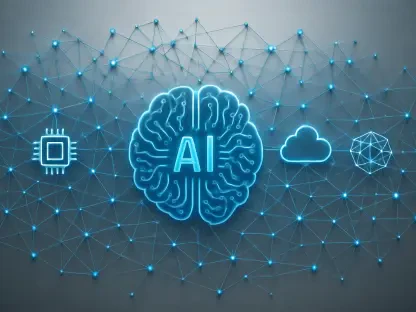The article “AI’s Dominance and Ethical Impact Expected to Shape Tech in 2025” provides a forward-looking analysis of the technological landscape expected in 2025, highlighting key trends, potential breakthroughs, and the evolution of established technologies. It also reflects on the main technological advances and themes that shaped 2024, offering a comprehensive outlook on what the IT industry might experience in the coming year.
Artificial intelligence (AI) is identified as the dominant theme for 2025, with ITPro editors unanimously agreeing on its continued prominence. AI’s role in enhancing business operations is expected to grow, as organizations that have invested in AI seek concrete returns. This anticipated progression includes the establishment of effective uses for AI investments, spurring improved productivity across various sectors.
AI’s Leading Role
Generative AI Models and Autonomous AI Agents
The consensus among ITPro staff is that AI will remain at the forefront of technological conversations. The rapid advancements in AI technologies, particularly generative AI models and autonomous AI agents, are anticipated to transform numerous industries. This shift not only promises increased efficiency but also aims to offer significant returns on AI investments made in the previous years.
Generative AI models are expected to become more sophisticated, enabling businesses to automate complex tasks and generate high-quality content with minimal human intervention. Autonomous AI agents, on the other hand, are likely to take on more responsibilities, from customer service to data analysis, further enhancing productivity and operational efficiency. In addition to these functions, these agents are expected to learn and adapt continuously, providing businesses with evolving capabilities that align with their changing needs.
The impact of generative AI models is likely to extend into creative industries as well, where they can assist in producing artistic content, music, and literature. Their ability to generate realistic simulations and scenarios is also anticipated to find applications in education and training sectors. Meanwhile, autonomous AI agents could play a crucial role in sectors requiring constant monitoring and real-time decision-making, such as healthcare, logistics, and manufacturing.
AI’s Impact on Business Operations
As AI technologies continue to evolve, their impact on business operations is expected to be profound. Companies that have already invested in AI will seek to maximize their returns by integrating AI into various aspects of their operations. This includes using AI for predictive analytics, process automation, and decision-making support. By leveraging AI, businesses can analyze vast amounts of data to identify trends, forecast outcomes, and optimize processes.
The integration of AI into business operations is anticipated to lead to significant improvements in productivity and efficiency. By automating routine tasks and providing valuable insights, AI can help businesses streamline their processes and make more informed decisions. This, in turn, can lead to cost savings and increased competitiveness in the market. For instance, AI-driven supply chain management can predict demand fluctuations and adjust inventory levels accordingly, reducing waste and enhancing efficiency.
In customer service, AI-powered chatbots and virtual assistants are expected to handle a more significant portion of inquiries, allowing human agents to focus on complex issues. Additionally, AI’s ability to personalize customer interactions based on previous behaviors and preferences can enhance customer satisfaction and loyalty. As businesses continue to explore AI’s potential, its integration into diverse operational facets will be instrumental in achieving strategic objectives and driving growth.
Ethics and Environmental Impact
Ethical Considerations in AI Development
Another significant trend highlighted is the growing focus on the ethical implications of AI. As AI technologies become more pervasive, concerns about their ethical use and potential biases are rising. The article predicts that these concerns will drive more profound discussions and possibly regulatory actions aimed at ensuring the responsible development and deployment of AI.
Ethical considerations in AI development include issues such as data privacy, algorithmic bias, and the potential for AI to be used in harmful ways. To address these concerns, companies and regulators are expected to work together to establish guidelines and standards for ethical AI development. This may involve implementing measures to ensure transparency, accountability, and fairness in AI systems. For example, AI developers might need to provide clear explanations of how their algorithms work and the data sources they use.
The accountability of AI systems will also be a focal point, with a push for mechanisms that allow users to challenge and rectify AI decisions. There is an increasing call for ethical AI frameworks that mandate periodic audits of AI systems to ensure compliance with ethical standards. Additionally, collaboration among international bodies to harmonize AI regulation may emerge to address the global nature of AI deployment and its cross-border impacts.
Environmental Impact of Data Centers
The environmental impact of AI is another critical issue that is expected to gain attention in 2025. As data centers proliferate globally to support AI operations, concerns about their energy consumption and environmental footprint are rising. The article predicts that these concerns will drive more profound discussions and possibly regulatory actions aimed at mitigating the environmental impacts of burgeoning data infrastructure.
Data centers are known to consume significant amounts of energy, contributing to carbon emissions and environmental degradation. To address these concerns, companies are expected to invest in more energy-efficient technologies and explore renewable energy sources. Additionally, governments may implement regulations to limit the environmental impact of data centers and promote sustainable practices in the tech industry.
Advancements in cooling technologies and the development of eco-friendly data centers could become focal points for mitigating environmental impacts. Efforts to transition to renewable energy sources, such as solar and wind, for powering data centers are likely to accelerate. Furthermore, there might be increased research into ways to repurpose waste heat from data centers for heating buildings or other applications, thus improving overall energy efficiency.
Cloud Repatriation
Renewed Interest in On-Premises Infrastructure
The repatriation of cloud workloads is slated to regain attention in 2025. Leaders might prefer on-premises infrastructure to address AI’s substantial data and energy costs. Although the repatriation trend of 2023 didn’t gain much traction, AI’s growing demands could initiate a renewed interest in localized data solutions, aiming for private AI deployments and reducing overall expenditures.
On-premises infrastructure offers several advantages, including greater control over data security and reduced latency. By repatriating cloud workloads, companies can better manage their data and energy costs, leading to potential savings and improved efficiency. This trend is expected to be particularly relevant for industries with stringent data security requirements, such as finance and healthcare.
By shifting to on-premises infrastructure, businesses can tailor their IT environments to meet specific performance and security needs while maintaining compliance with regulatory standards. This control can enhance data governance and privacy, which are increasingly important as data breaches become more prevalent. Additionally, reducing dependence on third-party cloud providers can minimize the risks associated with service outages and vendor lock-in, allowing for greater operational resilience.
Private AI Deployments
Private AI deployments are expected to become more common as companies seek to balance the benefits of AI with the need for data security and cost management. By deploying AI solutions on-premises, businesses can maintain greater control over their data and ensure compliance with regulatory requirements.
Private AI deployments also offer the potential for customization and optimization, allowing companies to tailor AI solutions to their specific needs. This can lead to more effective and efficient AI applications, further enhancing the value of AI investments. For example, companies might develop proprietary AI models fine-tuned to their niche market requirements, resulting in competitive advantages.
Moreover, private AI infrastructures can facilitate faster implementation of new AI capabilities without waiting for cloud providers to update their services. This agility enables businesses to swiftly adapt to changing market conditions and technological advancements. Private AI deployments may also encourage collaboration among departments, fostering innovation as teams work together to integrate AI into various business functions.
AI PCs
Evolution of AI-Powered PCs
The ITPro team agrees that AI will continue to dominate tech discussions. The fast progress in AI, especially generative AI models and autonomous AI agents, is expected to revolutionize many industries. This change promises higher efficiency and significant returns on past AI investments.
Generative AI models are set to become more advanced, allowing businesses to automate complex tasks and create high-quality content with little human input. Autonomous AI agents are likely to assume more roles, from customer service to data analysis, boosting productivity and operational efficiency. These agents are also expected to continuously learn and adapt, providing businesses with evolving capabilities that match their changing needs.
The influence of generative AI will likely expand to creative fields, aiding in the creation of art, music, and literature. Their ability to create realistic simulations will also be valuable in education and training. Simultaneously, autonomous AI agents could become crucial in areas needing constant monitoring and quick decision-making, like healthcare, logistics, and manufacturing.









